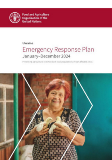In Berlin, FAO reaffirms commitment to improving Ukrainian farmers’ resilience and recovery
Over the next six months, FAO needs USD 150 million to reach more than 800 000 rural people in Ukraine

©Anastasiia Borodaienko
Given the importance of Ukraine to global food production, the Food and Agriculture Organization of the United Nations (FAO) continues to support the country in its efforts to maintain food security, said FAO Regional Programme Leader for Europe and Central Asia Raimund Jehle at the Ukraine Recovery Conference yesterday in Berlin. FAO’s 2024 Emergency Response Plan is carried out jointly with the Ukrainian Ministry of Agrarian Policy and Food and national and international partners, including the European Union.
Jehle also recognized the “tremendous resilience” of the farmers, foresters and fishers in Ukraine who “continue to feed Ukraine and the world”.
FAO’s activities this year, Jehle outlined, are focused on enhancing the country’s agrifood systems to achieve greater productivity, resilience and sustainability while safeguarding landscapes and managing natural resources.
The Ukraine Recovery Conference, held 11–12 June, is a continuation of an annual series of high-level political events dedicated to mobilizing continued international support for the swift and long-term recovery, reconstruction, reform and modernization of Ukraine. The 2024 conference focused on rapid recovery projects and emergency assistance for immediate needs under the motto “United in defence. United in recovery. Stronger together.” The conference also highlighted ways to unlock private-sector investments in Ukraine and actively engage civil society in the reconstruction process.
Supporting the resilience and recovery of Ukraine
The food and agriculture sector in Ukraine has been greatly affected by the war. According to FAO data, the sector’s war-related losses and damages since early 2022 are estimated as high as USD 80 billion, with about 17.4 million ha of arable land contaminated with explosives and mines. FAO estimates that one in four rural households in the country has reduced or interrupted agricultural production since 2022.
As Jehle stated in Berlin, the Organization has provided multifaceted support to the food and agriculture sector in Ukraine, with a special focus on helping smallholder farmers. Among other efforts in 2022–2023 FAO has restored the food security and self-sufficiency of more than 100 000 rural families at the front line, supported 6 000 small and medium-sized farmers to restore critical agriculture production and strengthen value chains, ensured the storage of over 6 million tonnes of grain by providing grain sleeves and modular storage units, cleared agricultural land from explosives in collaboration with the World Food Programme, and helped maintain phytosanitary and sanitary laboratories.
To implement the 2024 Emergency Response Plan, FAO requires USD 150 million in financial support by the end of the year to reach more than 800 000 people. The plan aims to improve the resilience of rural populations through the provision of comprehensive agricultural packages, support fisheries and improve animal health and livestock conditions in war-affected areas. FAO plans to support access to affordable firewood, restore agriculture critically disrupted by land contamination, and contribute to the rapid resumption of income earning.
“FAO welcomes discussions at the Ukraine Recovery Conference and stays committed to contributing to the recovery of Ukrainian agrifood systems,” Jehle said, “while supporting the most vulnerable who are suffering in the emergency context.”
FAO country profile – Ukraine
FAO emergencies and resilience: Ukraine
Ukraine Recovery Conference
Ukraine: EU-FAO partnership to ensure recovery and development of agricultural value chains
Publications:
Abstract of the food security and agricultural livelihoods assessment Ukraine (December 2023)
Ukraine: Humanitarian response update (June 2024)

